

I used to think that Twitter wasn’t very useful, until this year when I learned that Twitter is an amazing way to get what you want from any company you may do business with.
This may sound like a big claim, but I have real-world examples to share where companies not only responded to my Tweets, but they actually contacted me via email and phone, and made right by their mistakes — simply because I tweeted about the brand.
This response wasn’t only because I’m a fairly prolific online writer — although that might have played a small role. It’s mostly because of my ongoing behavior on Twitter, the manner in which I tweeted complaints, and my direct relationship with each company that I tweeted about.
Can you get what you want from any company you do business with? You bet you can, and I’ll show you how.
Do I have a reputation online for making trouble for companies? Probably.
I mean, I run a website where I often post articles about major fraud or conspiracies about corporate wrongdoing.

Does that mean that you have to be a journalist or a blogger to get the attention of the companies you deal with? Not really. But you do need to have a persona of someone who is more than willing to spread negative reviews or feedback about the company on the Internet.
This could be as simple as providing feedback about the companies you deal with on websites like Pissed Consumer or Ripoff Report (so long as you don’t post anonymously).
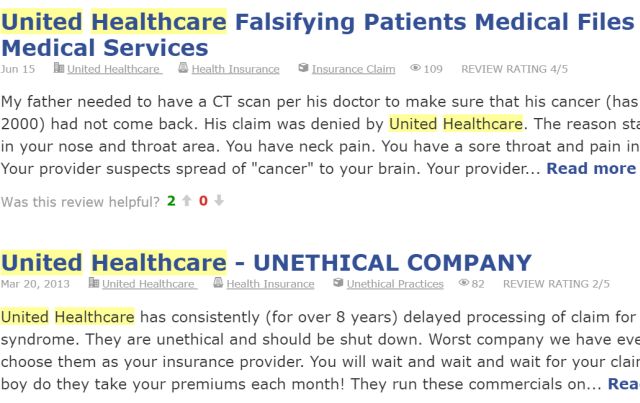
You could also make a habit of promoting the good companies you deal with, and critiquing the bad companies you deal with on a regular basis on social networks.
The bottom line is that when you do tweet a complaint about a company, the social media team at that company needs to see that you aren’t a one-tweet wonder. You are serious, and are likely to share your complaint with everyone you know, and everywhere online.
Here are a few examples of how Social Media can take your complaints to a whole new level.
In 2008, my wife got sick and our family started to face significant medical bills. By 2014, we had to make the decision to either pay credit cards, or pay the hospitals. We stopped paying our credit card bills. After about six months of this, and with mounting credit card bills (thanks to the banks increasing the interest rates to double-digits), we were facing bankruptcy.

We set everything up with a bankruptcy lawyer and were ready to roll within 30 days. Then I had a thought…why not take out a 401k loan and at least give the credit card companies one last ditch chance to get at least some of their money back?
To my surprise, they were all willing to accept some settlement — turns out medical costs is a valid reason for this kind of negotiation. The last bank to settle with us was Bank of America. Settlement date was set, and they were going to process payment on a Friday.
Friday came and little did I know, the bank processed the payment as a debit card transaction rather than as a check-by-phone. Because our bank sets a $500 limit on debit card transactions, the payment failed. Bank of America then sent us a letter saying that our settlement was null and void — and that we still owed them the full amount.
I fought with them for another four months, to no avail. So, I took the fight to Twitter.
If you're in the market for a credit card or loan, avoid @bankofamerica – they are much less understanding about medical issues than others.
— Ryan Dube (@rdube) October 8, 2015
And it took more than one Tweet. I actually followed up that one with a second, the same day.
We're racked with medical bills; what does @bankofamerica do? Reneged on initial settlement, and are now pushing us toward bankruptcy.
— Ryan Dube (@rdube) October 8, 2015
You’ll notice that in each case, I tagged the company. In this case that was @bankofamerica.
To my surprise, the next business day, I received an answer. I responded to it immediately.
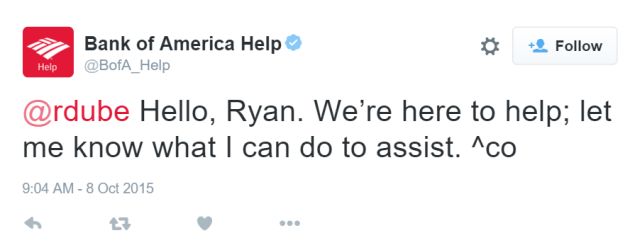
To which I responded, in no uncertain terms.
Honor our original settlement. https://t.co/jFVxjJzMJg
— Ryan Dube (@rdube) October 8, 2015
I received a private DM from the BoA social team, asking for my phone number. They called, and I filled them in with the whole story. The very nice lady said she would “work on this issue for me personally.” I have to be honest, I expected nothing to happen.
To my surprise, I received a call from a Bank of America executive, offering to reinstate the original settlement and re-process the payment. In less than 48 hours, just a couple of Tweets had resolved an issue that four months of phone calls couldn’t!
The same financial woes led us to falling behind with our car payments for two months. One day, I received a call from one of their collection agents, and after I expressed our medical situation, he offered to extend our loan by one month to give us a chance to “catch up”.
Well, apparently either he forgot to, or for some other reason the extension never happened. We ended up three months late, and our car was in danger of getting re-possessed. So, I tweeted about the situation.
Lesson to anyone reading this, avoid TD Bank @TDBank_US for any auto loans. They tricked us, saying we'd get a 2 mo extension and lied.
— Ryan Dube (@rdube) September 22, 2015
Once again, the response was swift. Within 24 hours, the social media team at TD Bank responded.
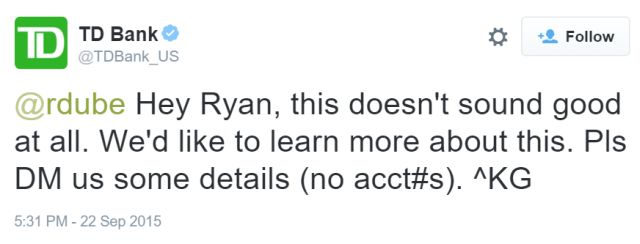
This was an amazing turn of events to say the least!
After sending over my details, I received a phone call from a local branch manager named Matt, who helped us set up an actual extension that would prevent the repossession from taking place. Crisis averted. Thank you, Twitter!
It isn’t just banks who care about their brand on Twitter. The same thing happened when our health insurance provider decided to call an ambulance service to our house as “out of network”, as though we are somehow able to shop around for ambulance service when calling 911.
Hey @myUHC – you labeled an ambulance service as "out of network"…so are people expected to shop around when calling 911 now? #healthcare
— Ryan Dube (@rdube) September 21, 2015
The response to this tweet was more swift than any other I’d ever seen. Within an hour of posting this tweet, I received a phonecall on my cellphone. It was the United Healthcare social media team following up to figure out what my tweet was about and what they could do to help.
Within 24 hours, the claim had been reprocessed with the ambulance service considered as in-network and covered in full.
In just a few months, I had tweeted complaints about three companies that I do business with, and in every case the complaint was responded to and dealt with immediately.
The lessons here are important. You too can achieve these kind of results, so long as you follow some very simple guidelines when tweeting your complaints.
Remember, with great power comes great responsibility — so use this power sparingly and wisely.
This is a relatively new phenomenon. Up until about 2012 or 2013, companies largely ignored social media, but more recently, business pundits are advising companies that ignoring social media reputation can be dangerous.
One “Business tip of the day” 2013 Time Magazine article made this very clear.
“Social media has become a critically important channel for customer service and feedback, so companies that ignore it do so at their peril.”
Companies have taken the business pundits advice very seriously, and this plays out very much in your favor when you end up getting the short end of the stick when dealing with any business!
There is one caveat to all of this. Once a company does right by you, don’t forget to do right by it. Let everyone know, very publicly, just how helpful the company was.
Shout out to @BofA_Help – Carol helped us sort out year-long @BankofAmerica problems in 1 week! Hopefully it's finally resolved. Thank you!
— Ryan Dube (@rdube) October 15, 2015
This not only makes it clear that you aren’t just a “negative Nancy” or a “downer Dan”, but that you are also more than happy to give a company the credit it deserves, when it does right by its customers.
I want to thank local Maine @TDBank_US branch manager Matt for reaching out with a loan extension. Thank you – here's hoping it's approved!
— Ryan Dube (@rdube) October 15, 2015
This is also an important way for all of us — regular Twitter users — to encourage these companies to continue replying to customers and fixing the problems that led to the Twitter complaints in the first place!
Credit where credit is due, @askUHC reached out to help with a problem claim after my previous Tweet. That's impressive.
— Ryan Dube (@rdube) September 22, 2015
Thank the company for helping you out, and then go on with your normal tweets, reserving your tweet complaints for those rare times when you’ve run into a major problem with a product or service.
If you follow all of these general guidelines, you’ll find that Twitter is probably the single most effective way to resolve any complaints you may have.
Have you ever filed any grievances or complaints about a company on Twitter? Did you get a response back, and did they resolve the issue for you? Tell us about your own experiences in the comments section below!
Image Credit: Businessman tied up by imagedb.com via Shutterstock, auremar via Shutterstock

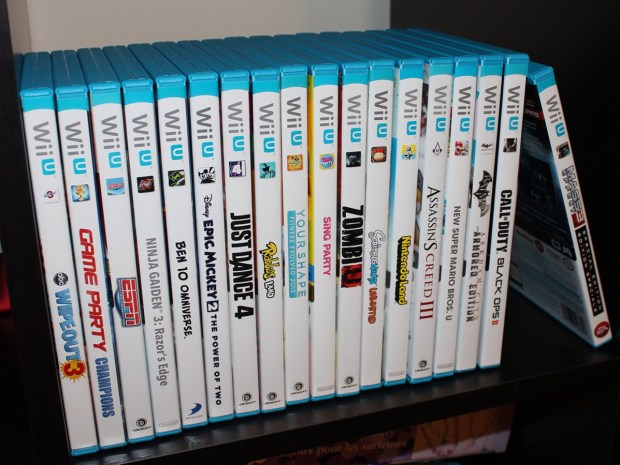


 Demi Lovato is elected by CNN the most important celebrity in the fight against mental illness
Demi Lovato is elected by CNN the most important celebrity in the fight against mental illness Bastion Walkthrough
Bastion Walkthrough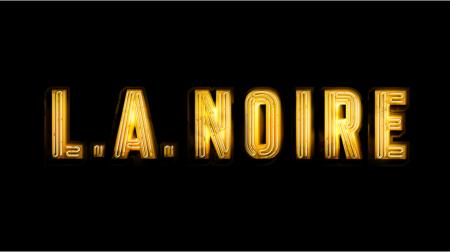 L.A. Noire Guide
L.A. Noire Guide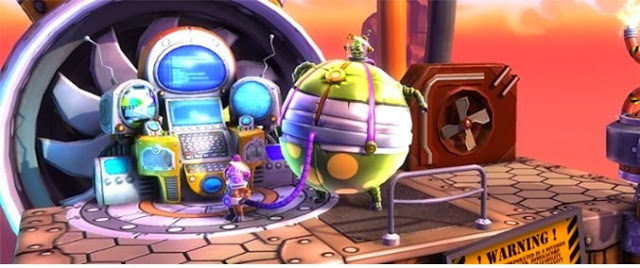 Shiftlings (PC) Achievements / Unlockables
Shiftlings (PC) Achievements / Unlockables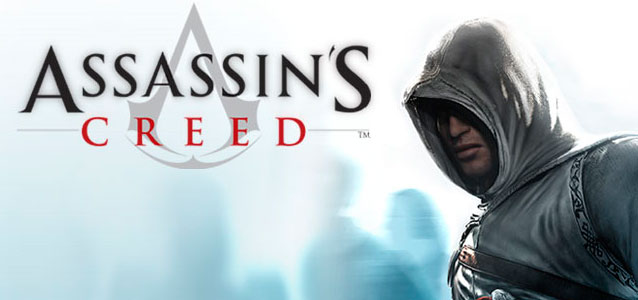 Top 10 Best Action Games For PC
Top 10 Best Action Games For PC